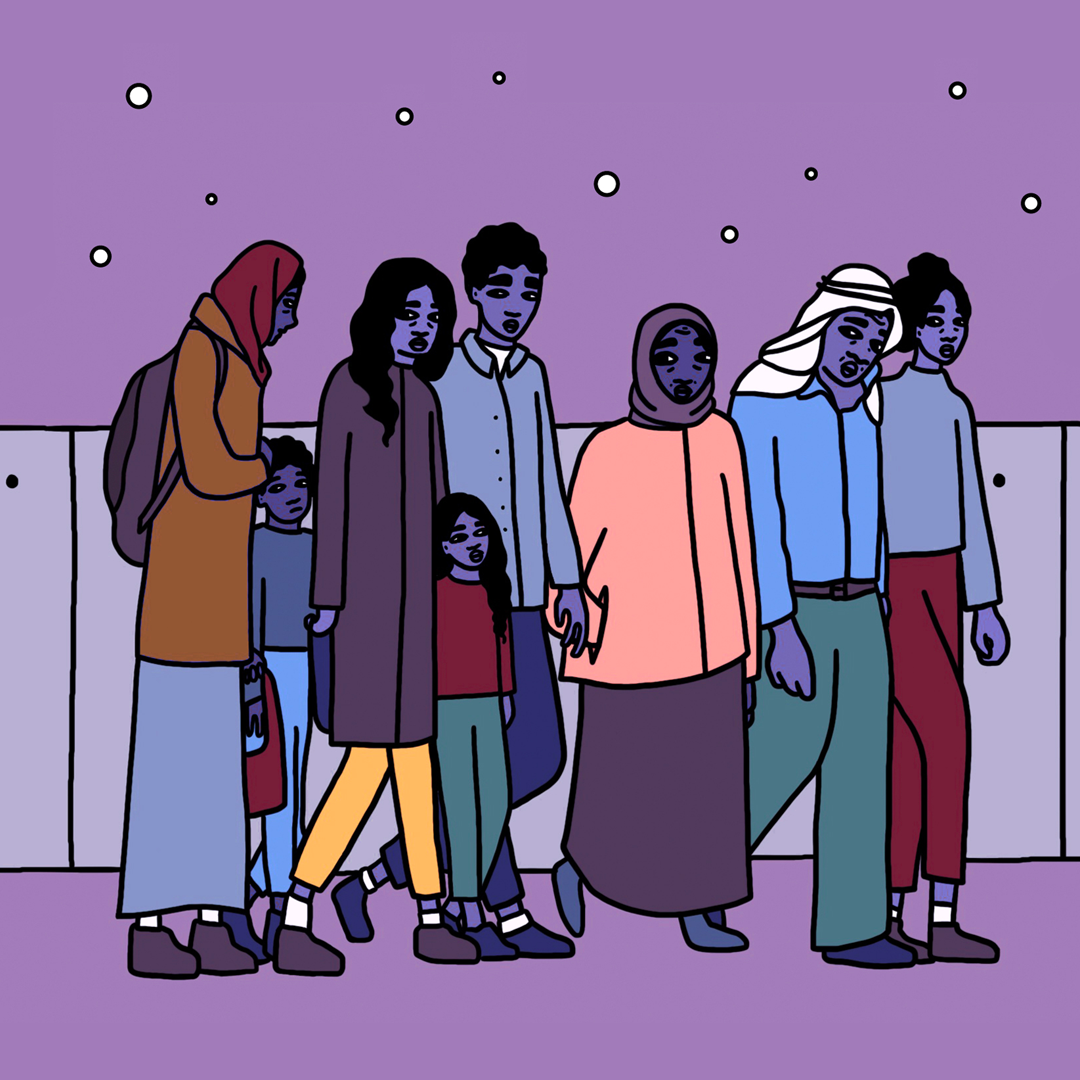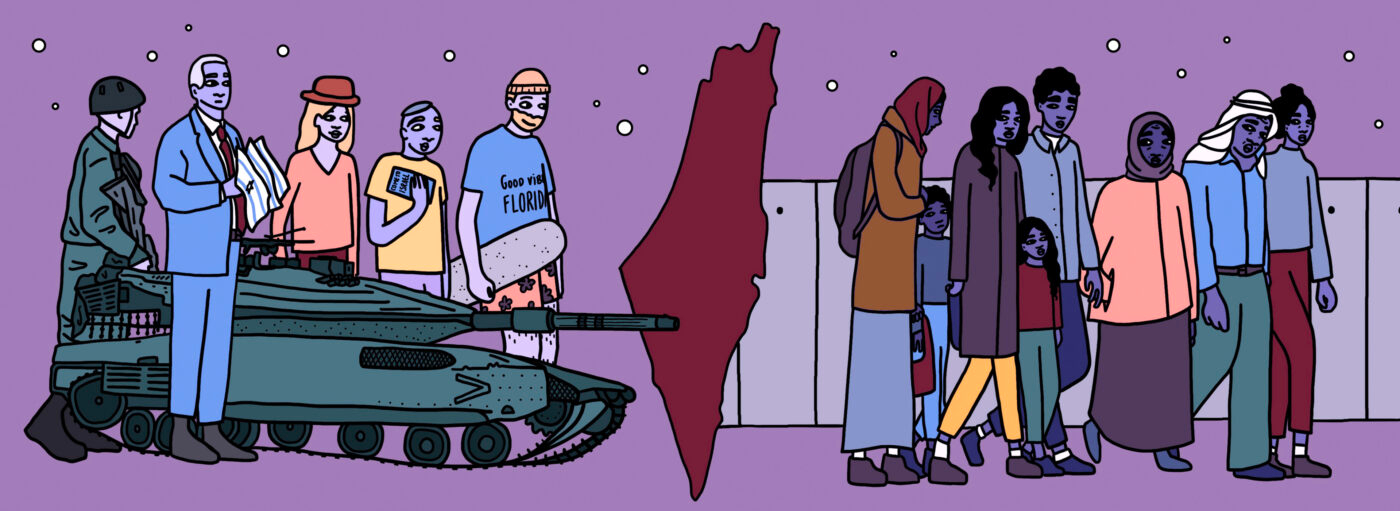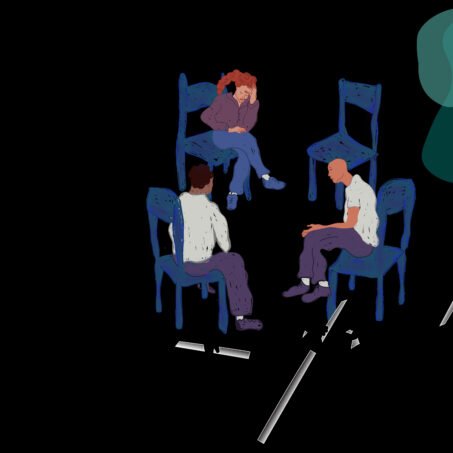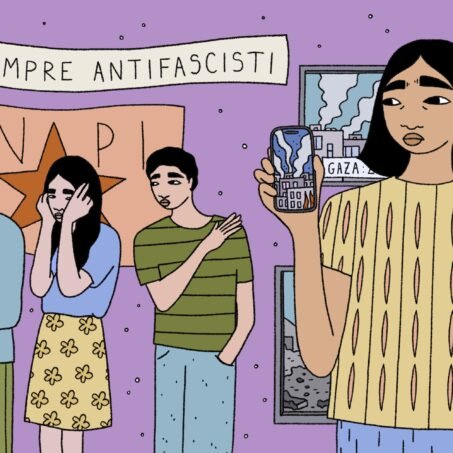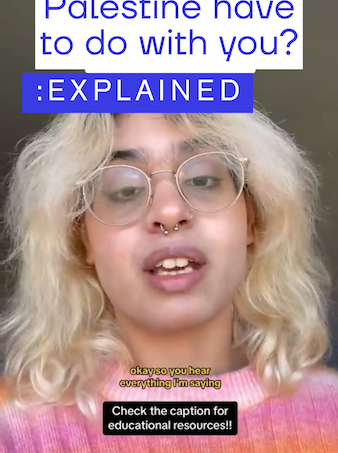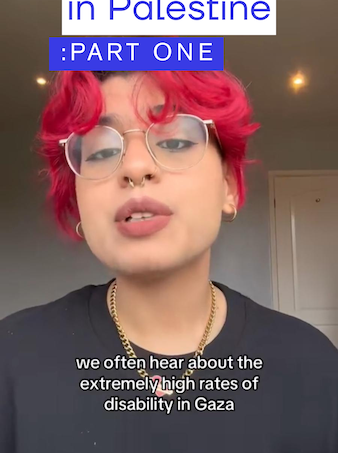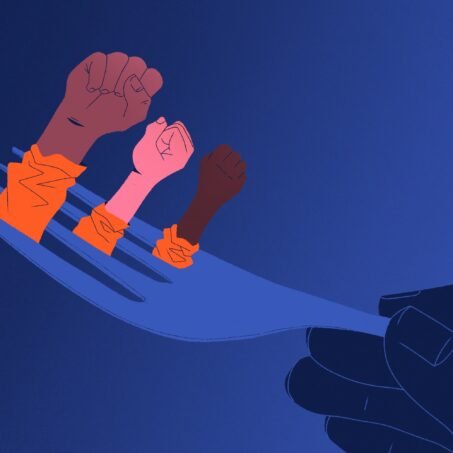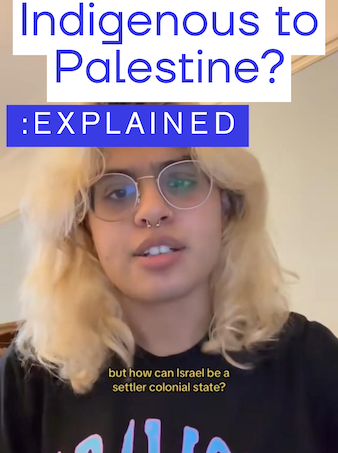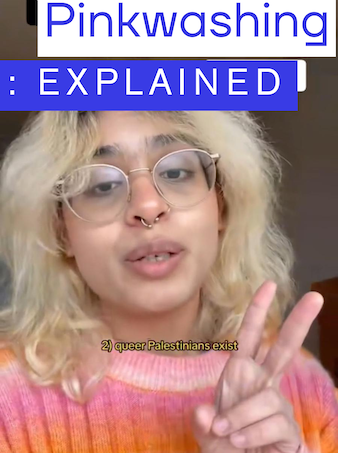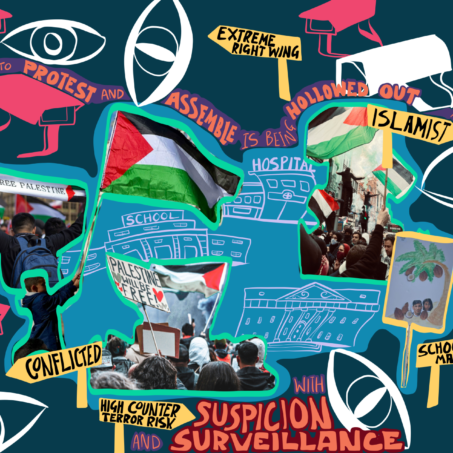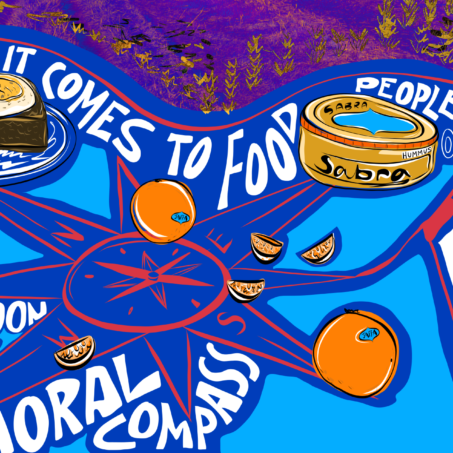On the question: What is Zionism?
What is Zionism? It is impossible to answer this question fully without acknowledging that many who ask it do so insincerely. They ask not hoping to receive a genuine answer but reassurance that they, their family members, their friends, and their community are good.
They ask what Zionism is, subtly presupposing Palestinians as irrational, entirely fictional actors whose perspectives, experiences, and history couldn’t possibly impact the ‘true’ meaning of Zionism. They ask it searching for a glimmer of hope that Zionism is defensible, that Zionism is justified. For this group of people, no truthful answer would be sufficient because no truthful answer allows reconciliation between their hopes and what Zionism actually entails.
In a discussion between someone searching not for answers but for affirmations, the ideal response is not an answer but an affirmation. Zionists today happily supply it. Asking a Zionist about Zionism initiates an almost rehearsed script: they talk about ideas, about feelings and beliefs, about values, about religion. They make distinctions between every “type” of Zionism, artificially separating it into different forms: Zionism the ideology, Zionism the political philosophy, Zionism the religious belief.
All these ideological separations never address what, in fact, Zionism does. Their answers seek to conceal any non-manufactured reality and any history of either Palestine or Palestinians.
Even the most fantastical nationalist mythology is wielded by Zionists as fact because Zionists don’t need it to be true, they need it to be believed, and it is very easy to believe what makes you out to be a hero. Salaita makes clear in Israel’s Dead Soul, “meditation on Israel’s anguished soul, close analysis illustrates, is mostly an excuse to consciously ignore its violence or to disregard the structural qualities of that violence.”
I ask you to reflect on why you came to this page and consider whether you truly want an answer. If you found this page because you are genuinely interested in learning more about Zionism, I hope this brief primer will be helpful and the additional resources provided can guide you further.
Two descriptions of Zionism
There are two primary groups of people who have had the clarity and the necessity to describe Zionism with dry honesty: Palestinians, for whom Zionism is not an idea but a reality imposed upon them, and the early Zionists, who needed pragmatic and specific ideological goals to ensure Zionism’s ultimate fruition.
1: Zionism in the words of Palestinians
Palestinian writer Steven Salaita notes, “we must remember that Zionism, as difficult as it is to define, is an ideology that supports a colossal military enterprise and underlies one of the greatest and most intractable conflicts of our time.”
While he offers his own definition of Zionism, which is that Zionism is “in essence and practise the belief that Jews have the right to a nation-state in historic Palestine that is majority Jewish,” Salaita reminds us not to let the difficulty of pinning down the ‘right’ definition pull us away from the reality of Zionism’s settler-colonial military conquest.
Similarly, Huda Ammori, co-founder of the organisation Palestine Action, describes Zionism in the material sense: “It’s having your home demolished, or your local village destroyed, or being trapped in Gaza and having your rights taken away from you and not knowing whether one day or the next you are going to face another attack by the occupier.”
Ammori continues, “Zionism means for Palestinians in the diaspora or those in refugee camps, that they don’t have the right to return to their homes. But it also means that any Jewish person anywhere in the world can have a right to live on the rubble of a Palestinian home.” Ammori leaves no room for ideological equivocation or glorification of the Zionist project.
In The Strategy for the Liberation of Palestine, a widely popular and incredibly effective Palestinian resistance text, the ‘Popular Front for the Liberation of Palestine’ (PFLP) describes how Zionism is not just a Jewish project in Palestine but is directly connected to the overall global colonial movement.
“Zionism as a racial-religious movement” writes the PFLP, “is trying to organise and recruit 14 million Jews in all parts of the world to support Israel, protect its aggressive existence and consolidate and expand this existence.”
According to the PFLP, “this support is not confined to moral backing: it is really and basically a material support that provides Israel with more people, more money, more arms, more technical know how and more alliances concluded by the movement by virtue of its influence, in addition to its support through publicity and propaganda in every part of the world.”
Lastly, the incredibly well-researched and extensive collection of resources and information from Decolonize Palestine defines Zionism simply, as “a colonial ideology and political movement that calls for establishing a Jewish nation state in Palestine with a Jewish majority.”
Slight differences notwithstanding, the above definitions of Zionism- all from the standpoint of those targeted by Zionism- focus on the material reality for Palestinians under Zionism. They focus not on what people want Zionism to be but on how it has actually manifested.
2: Zionism in the words of its founders and early leaders
Unlike contemporary Zionism’s PR strategy, early Zionists could not rely on rhetorical distance between their goals and their corresponding actions. They needed to be honest and clear about Zionism’s aims in order to gain adherents and earn the support of anti-Semitic, Orientalist European leaders.
Theodore Herzl is widely considered to be one of, if not the, founder(s) of Zionism. His 1896 text “The Jewish State” provides a succinct blueprint laying out the process of actively developing Zionism.
He details ways that Zionists could acquire enough money to move thousands of European Jews to Palestine; what would be done with the property of the Jews who left; how Zionists could earn the support of the non-Jewish world; the distribution of labour and resources in the new colony; and what global socio-political mechanisms could be used to influence Jewish people to leave Europe for Palestine.
Throughout the text, Herzl makes it clear that the goal of Zionism is to create a Jewish European settler-colony in Palestine (although, he carefully considered other locations before deciding Palestine had the highest chance of success) and refers to the prospective Jewish settlers as colonists.
Herzl even opined, in typical Orientalist white-supremacist fashion, that the Zionist project would help “form a portion of a rampart of Europe against Asia, an outpost of civilisation as opposed to barbarism.”
According to Herzl, one of the strongest factors that would motivate Jewish people into becoming Zionists was anti-Semitism. To Jews, Herzl’s argument was that anti-Semitism would never go away and you need to leave Europe. And his proposal to non-Jews was: if you want the Jews out of your country, the Zionist project can be a very effective way to get rid of them.
In The Jewish State, Herzl stated, “governments will, either voluntarily or under pressure from the Anti-Semites, pay certain attention to this scheme, and they may perhaps actually receive it here and there with sympathy.”
To Herzl, Zionism was not a way to get rid of anti-Semitism or in opposition to it, Zionism and anti-Semitism were mutually beneficial. While Herzl died in 1904 before the Zionist project in Palestine was ultimately realised, his contributions cannot be overstated.
Another important early Zionist was Ze’ev Jabotinsky. As a military leader and theorist, Jabotisnky was pragmatic and honest. His contributions continue to be felt throughout “Israel”, creating the precursor to today’s right-wing Israeli Likud party.
In his famous essay, The Iron Wall, Jabotinsky proclaims that it didn’t matter, even then, how any Zionist felt about Zionism; the reality was that colonisation could not be carried out peacefully and without the opposition and resistance of the Indigenous Palestinians.
He writes: “there can be no voluntary agreement between ourselves and the Palestine Arabs. Not now, nor in the prospective future. I say this with such conviction, not because I want to hurt the moderate Zionists. I do not believe that they will be hurt. Except for those who were born blind, they realised long ago that it is utterly impossible to obtain the voluntary consent of the Palestine Arabs for converting “Palestine” from an Arab country into a country with a Jewish majority.”
He continues, “Zionist colonisation must either stop, or else pave population. Which means that it can proceed and develop only under the protection of a power that is independent of the native population – behind an iron wall, which the native population cannot breach. That is our Arab policy; not what we should be, but what it actually is, whether we admit it or not.” Across “Israel,” roads, schools, and monuments are named after and show reverence for Jabotinsky.
Another notable early Zionist leader is Yosef Weitz, an early director of the Jewish National Fund’s (JNF) Land and Afforestation Department. His main focus was literally on displacing the Palestinians from their land and replacing them with Jewish settlers.
Nur Masalha, in the text Expulsion of the Palestinians: The Concept of Transfer in Zionist Political Thought (quote found by Palestine Remembered), describes a meeting in 1937 where Weitz stated “the transfer of the Arab population from the area of the Jewish state does not serve only one aim—to diminish the Arab population. It also serves a second, no less important, aim which is to evacuate land presently held and cultivated by the Arabs and thus to release it for the Jewish inhabitants.”
Beyond Herzl, Jabotinsky, and Weitz, brief biographies of and important quotes from a litany of other important early Zionist leaders like David Ben-Gurion, Chaim Weizmann, and Menachem Begin can be found at PalestineRemembered.com.
In looking at the words of each of these early Zionist thinkers, it is quite clear that Zionism is a movement that, since its founding, has been focused on the expulsion and dispossession of Palestinians. For the Palestinians who could not be killed or expelled, Zionism necessitated the maintenance of a brutal system of oppression and subjugation. That oppression is, according to Zionists, a core feature entirely justified.
Bickering over any one specific definition of Zionism is ultimately irrelevant, because there is no definition that could justify what the movement has done and continues to do to Palestinians. For the subjugated, Zionism simply does what Zionism set out to do: how it has manifested, how it has impacted Palestinian life. A true definition contradicts what Zionists proclaim, no matter how far they distort, and alter its meaning.
I offer these definitions, which bear considerable overlap with each other in certain respects, not because any one of them is ‘the correct’ one, but because each of them focuses on the reality, not the mythology, of Zionism.
In the words of Palestinian poet Mohammed El-Kurd, “Zionism is a death cult. This statement should not spark outrage. What should be is the fact of a Zionist killing a Palestinian every three days. Enough.”
Is Zionism Judaism? Does it matter?
Zionists frequently assert that Zionism is not only inherent to Judaism but is Judaism. Anti-Zionists often respond with the opposite – that Zionism is not Judaism. It’s actually quite important to explicitly state that it doesn’t matter whether Zionism is Judaism or not. When we focus on this question, we pull away from the reality facing Palestinians and centre the perspectives of those who benefit from Zionist oppression and dispossession. At the end of the day, Zionism being Jewish wouldn’t make the ongoing crimes of Zionism acceptable.
Zionism is a Jewish colonial movement in Palestine that is supported by many non-Jews. Its founders and many of its early supporters were Jewish. Many of the most visible and outspoken Zionists today are Jews. Zionists in Palestine use Jewish symbols, Jewish history, and the Jewish religion itself to further Zionism. Zionists condemn those who speak out against Zionism with claims they are anti-Semitic and defend celebrities and politicians who make anti-Semitic remarks when they proclaim their support for “Israel.” The star of David is spray painted, by Jewish Zionist settlers, onto the cars and homes of Palestinians. And the majority of Jews are, in fact, Zionists. Does this make Zionism Jewish?
On the other hand, most Zionists in the world now are not Jewish, they are Christian. One of, if not the, largest Zionist organisations in the world, is Christians United for Israel (CUFI), an anti-Semitic Christian Zionist organisation. Non-Jewish Zionist politicians like Joe Biden have repeatedly made clear that they support “Israel” due to its value as a military asset and strategic ally in the region, not because it is or isn’t Jewish. And there are numerous prominent non-Jewish Zionists with a history of anti-Semitic remarks. Finally, there are scores of Jewish people and organisations who oppose Zionism. Does that make Zionism not Jewish?
Ultimately, whether or not Zionism is Judaism doesn’t matter as something “being Jewish” doesn’t mean it is morally right.
It is also important to note the rhetorical sleight-of-hand often employed by Zionists in this respect. For Zionists, Zionism is synonymous with Judaism until the opposite can be rhetorically or tactically useful.
When anti-Zionist student organisations protest Hillel (a Jewish Zionist organisation) at many colleges and universities, for hosting a former “Israeli” military official, Zionists claim they are protesting Jews on campus and threatening the safety of Jewish students. But when people ask Jewish people, even those who directly contribute to the Zionist project, to explain their support for Zionism or answer for its evil acts, suddenly, Zionism and Judaism are totally different. Jewish Zionists place the “Israeli” flag and blue JNF tzedakah donation boxes (that are used to literally fund the dispossession of Palestinians) in synagogues across the world. But erase that to pretend it is an act of aggression against Jews for being Jewish when a progressive organisation systemically maps support for Zionism, among other reactionary and racist political ideologies, in their city and includes some Jewish organisations.
What is the History of Zionism?
Zionists often trot out Jewish customs or portions of centuries or even millennia old Jewish religious texts that refer to Jerusalem or Yisrael or Zion as proof that Zionism is thousands of years old. In reality, none of these customs or texts describe or even predict today’s nuclear armed Zionist settler-colony, which was founded in the 1900s.
Much of Zionist discourse relies on intentional misreadings that presume a fictitious continuity of meaning. In actuality, the history of Zionism is the history of the movement for the colonisation of Palestine. I will only attempt to provide the briefest of summaries of that history, relying on and pointing to much more comprehensive resources.
The term Zionism was first coined in the late 1800s by Nathan Birnbaum, an Austrian Jew, who would eventually come to strongly oppose Zionism. Zionism was later popularised and transformed into a real movement by Theodore Herzl. One year after releasing The Jewish State, Herzl organised the first Zionist congress in Basel, Switzerland. There, the adopted Basel Program explicitly stated that Zionists were working “to secure for the Jewish people a publicly recognised, legally assured homeland in Palestine.”
In the following years, the early Zionist leaders sought to build relationships within and outside Jewish communities and especially with various European political leaders, with the aim of garnering enough support to realise their settler-colonial fantasy.
WWI and WWII dramatically transformed the global political landscape. Decolonize Palestine’s series of introductory Palestine 101 articles provides an incredibly helpful history of not just the Zionist movement but of Palestine itself.
“In the wake of its defeat in WW1,” Decolonize Palestine writes, “the Ottoman empire was dissolved and its regions carved up and divided among various European colonial powers. In the Levant, Palestine and Jordan fell under the mandate of the British, while Syria and Lebanon to that of the French. The British entered Jerusalem in 1917, and Palestine officially became a mandate in 1922.”
According to Decolonize Palestine, “the mandate of Palestine provided a golden opportunity for the Zionist movement.” The British tended to be supportive of the Zionist project (the British, through the Balfour Declaration, had already made clear their intent to support the creation of a Jewish state in Palestine) and under British control, it was more likely that the Zionists would be able to realise their goal.
Note: Though British support for the Zionist project during that period was essential for the growth of Zionism, it was not motivated by an opposition to antisemitism or support for Jewish people. In Winston Churchill’s 1920 article Zionism versus Bolshevism, Churchill, at the time Secretary of State for the Colonies, made clear that British support for Zionism was based on the fact that Zionism benefited Britain.
He writes, “if, as may well happen, there should be created in our own lifetime by the banks of the Jordan a Jewish State under the protection of the British Crown, which might comprise three or four millions of Jews, an event would have occurred in the history of the world which would, from every point of view, be beneficial, and would be especially in harmony with the truest interests of the British Empire.”
Using a variety of anti-Semitic tropes, Churchill described Zionist nationalist Jews as “good Jews” who stand in opposition to the evil “antichrist” internationalist marxist Jews attempting to destroy western Christian civilisation.
After the Balfour Declaration, support for the Zionist project in Palestine grew and so did efforts to move Jews there from Europe. Additionally, many Jews fled the region as the Nazis gained power and started to carry out the Nazi Holocaust.
Despite certain elements of Zionist mythology to the contrary, the Zionist project was not a product of the Holocaust, as it had started decades earlier, but absolutely was impacted by it.
Rashid Khalidi, in The One Hundred Years War on Palestine, writes: “Hitler’s ascendancy proved to be one of the most important events in the modern histories of both Palestine and Zionism. In 1935 alone, more than sixty thousand Jewish immigrants came to Palestine, a number greater than the entire Jewish population of the country in 1917.”
Seeking refuge was not a specifically Jewish issue. Throughout history, Palestine has offered a place of refuge for those fleeing famine and war, and is home to Palestinians from Armenia, Bosnia and even India.
As Decolonize Palestine writes: “They all came to Palestine for different reasons, and to this day form an integral part of its society. The issue was never with the idea of Zionists moving to Palestine, but rather that from the onset, the Zionist movement was not interested in coexistence.” Decolonize Palestine’s coverage of this period includes numerous quotes where Zionist leaders stated quite explicitly that they did not want to live in Palestine but wanted to conquer it. Unfortunately, this is exactly what the Zionists did.
The Nakba
From December 1947 to mid-May 1948, In what became known as the Nakba (translated from Arabic as “the catastrophe”), Zionists engaged in a horrific ethnic cleansing campaign against the Palestinians.
Decolonize Palestine, writes “before, during, and after the war of 1948,” in which so-called “Israel” declared its independence, “approximately 800,000 Palestinians [were] expelled from their homes, and over 530 Palestinian communities demolished.”
According to Khalidi, the Nakba “transformed most of Palestine from what it had been for well over a millennium – a majority Arab country – into a new state that had a substantial Jewish majority.”
In this way, when people celebrate “Israeli independence day,” they are celebrating the Nakba.
Of the nearly one million Palestinians displaced, Khalidi notes, “none were allowed to return, and most of their homes and villages were destroyed to prevent them from doing so. Still more were expelled from the new state of “Israel” even after the armistice agreements of 1949 were signed, while further numbers have been forced out since then.”
“In this sense,” he writes, “the Nakba can be understood as an ongoing process.” And it is this ongoing process that has animated Zionism in Palestine, “Israeli” politics, and global support for Zionism, since.
After the events of the Nakba, Khalidi describes a shift in political influence within the Zionist movement where predominantly British support gave way to that of so-called America and the USSR (whose support for “Israel” was consequential but relatively short lived).
He writes “Before long, the Zionist movement had mobilised many American politicians and much of public opinion around this objective. This was a result of both of this movement’s unceasing and effective public relations efforts, which the Palestinians and the fledgling Arab states were unable to match, and of widespread horror at the revelation of the destruction of most European Jewry by the Nazis in the Holocaust. After President Harry Truman endorsed the goal of a Jewish state in a majority Arab land in the post-war years, Zionism, once a colonial project backed by the declining British Empire, became part and parcel of the emerging American hegemony in the Middle East.” This has only become truer in the subsequent decades. As former US Army general and US secretary of state under president Richard Nixon, Alexander Haig, once said, “Israel is the largest American aircraft carrier in the world that cannot be sunk, does not carry even one American soldier, and is located in a critical region for American national security.”
The Six Day War
In 1967, Zionist forces attacked Egypt and Syria and ultimately took military control over the West Bank, the Gaza Strip, the Egyptian Sinai desert and the Syrian Golan heights.
Decolonize Palestine, again, provides historical context of the 1967 war and explains how this war was part of “Israel’s” broader Zionist settler-colonial expansionist goal and was not ‘self-defence,’ as Zionists claim. Decolonize Palestine states: “The revisionism surrounding the 1967 war is one of “Israel’s” most significant propaganda achievements. Suddenly, reality is flipped on its head, and the powerful aggressor becomes an underdog fighting to stave off extermination, though no such threat really existed.”
What is happening today?
Today, the Zionist project still exists and maintains control over Gaza, the West Bank, and Golan Heights and has invested billions upon billions of dollars into protecting that control.
For decades now, Zionist settlers, with the protection and support of Zionist military forces, have moved into these occupied zones and built homes and settlements inside them. These settlements, as is the entire Zionist project, are bolstered by not just a global propaganda machine that relentlessly defends them but also direct monetary support to ensure that the Zionists can continue to expand further and make undoing Zionist colonisation efforts more difficult.
The documentary Thank God It’s Friday provides an explicit picture of what this illegal settler expansion looks like in practice. These zones under Zionist control are what even many Zionists today refer to as “the occupation,” but it is important to note that they make up only a portion of the overall Zionist project.
Throughout the past 50 years, there have been many explosions of grassroots Palestinian resistance to Zionism in general and to specific manifestations of Zionist displacement and violence (such as direct opposition to Zionist home demolitions or settler invasions of Al-Aqsa Mosque). In multiple instances, those resistance efforts against the Zionist project have grown into enormous wide-spread uprisings, which have come to be known as the two Intifadas.
Additionally, there is ongoing debate that the Zionist project is, right now, facing the protests and opposition that may eventually be seen as the start of the third Intifada, however this is yet to be determined.
What can you do?
Both inside and outside Palestine, there are numerous organisations and individuals who organise and theorise to further the struggle against Zionism. I acknowledge that this list is absolutely not an exhaustive one. However, here are some key individuals, organisations, and resources, in no particular order, that you might be able to support, that might be organising near you, or that can help guide you:
Follow:
- Students for Justice in Palestine (SJP)
- Palestine Youth Movement (PYM)
- Steven Salaita
- Good Sheperd Collective
- Palestine Action
- US Palestinian Community Network (USPCN)
- US Campaign for the Academic and Cultural Boycott of israel (USACBI)
- Palestinian Feminist Collective
- The Mapping Project
- Al-Awda: The Palestine Right to Return Coalition
- Rabab Abdulhadi
- Samidoun: Palestinian Prisoner Solidarity Network
- Huda Ammori, co-founder of Palestine Action
- Within Our Lifetime (WOL)
- Mohammed and Muna el-Kurd
- Boycott, Divestment, and Sanctions movement and localised BDS efforts in your city
Read and Watch:
- The Hundred Years’ War on Palestine by Rashid Khalidi
- Strategy for the Liberation of Palestine by the Popular Front for the Liberation of Palestine
- Edward Said
- Ghassan Khannafani
- Susan Abulhawa
- DecolonizePalestine
- The Electronic Intifada
- Thank God It’s Friday
You can access shado’s other Knowledge Pages HERE
